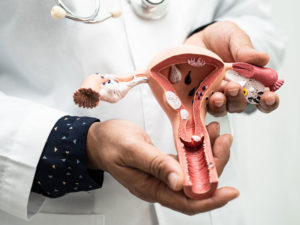
Do you always wonder when your next period will be? Or do you feel your premenstrual symptoms (PMS) never go away? Irregular periods, irritability, and difficulties getting pregnant may be signs of low progesterone levels – a condition that can seriously compromise your reproductive system – and a need for low progesterone therapy.
That’s because progesterone is a hormone that plays a crucial role in the menstrual cycle and pregnancy. So, if your body doesn’t produce it enough or can’t use it properly, you’ll feel the impact of low progesterone levels on your overall health.
But don’t fret. There are some practical ways of relieving the symptoms and getting your hormones back on track with progesterone therapy and lifestyle adjustments.
Keep reading to learn how to identify if your progesterone levels are low, what triggers this imbalance, and what you can do to increase its production and reclaim a healthier and happier life, regardless of your age.
Table of Contents
Why is Progesterone Important to Female Health?
What Happens If Your Progesterone Is Low?
Possible Reasons for Low Progesterone
How to Naturally Increase Your Progesterone Levels
What to Expect from Low Progesterone Hormone Therapy
What is Progesterone?
Progesterone is a key hormone for women. Together with estrogen, it is the primary sex hormone in the female reproductive system.
As with any hormone your body produces, natural progesterone is crucial for many physiological processes, but it’s particularly important for regulating your cycle, preparing your uterus for conceiving, and ensuring a healthy pregnancy.
When your body is functioning well and you have healthy hormone levels, your progesterone levels fluctuate, with your ovaries producing most of it during the second half of the menstrual cycle. This phase – known as the luteal phase – helps to prepare your uterine lining for a potential pregnancy.
If pregnancy doesn’t occur, your progesterone levels drop, you shed your uterine lining, and start a new menstrual cycle. But when pregnancy occurs, your progesterone levels continue to increase.
After ovulation, the ruptured follicle transforms into a structure called the corpus luteum. The corpus luteum produces progesterone during the early stages of your pregnancy, supporting your uterine lining and preventing a miscarriage.
After the initial stages of pregnancy, the placenta takes over the responsibility of producing progesterone and maintaining the uterine lining. This creates a suitable environment for the developing embryo and supports your pregnancy.
However, the importance of healthy progesterone levels is not limited to pregnancy.
Progesterone production and hormonal balance – including the proper ratio of progesterone to estrogen – are essential to avoid estrogen dominance and to promote overall reproductive health and lifelong wellbeing.
Let’s look at why.
Why is Progesterone Important to Female Health?
Menstrual Cycle Regulation
As we mentioned, the balance of progesterone and estrogen, along with other hormones, orchestrates the various phases of your menstrual cycle, including preparing your uterine lining for pregnancy or the shedding of the uterine lining with menstruation.
With dysfunctional ovaries or low progesterone production, your cycles will be irregular or unpredictable.
Breast Development and Lactation
Progesterone and estrogen are responsible for developing your mammary glands.
During pregnancy, increased levels of progesterone and estrogen contribute to the enlargement of these mammary glands and the formation of alveoli – tiny sacs that produce and store milk.
While prolactin is the primary hormone responsible for milk production, progesterone contributes to inhibiting lactation until after childbirth. The drop in progesterone levels after delivery allows for the onset of full lactation and the establishment of breastfeeding.
Brain Health
Progesterone offers notable benefits for brain health as it can cross the blood-brain barrier, influencing various aspects of neural function. This hormone plays a crucial role in promoting the growth of neurons, modulating neurotransmitters, and exerting neuroprotective effects. It contributes to cognitive well-being, potentially enhancing memory and cognitive performance.
Mood Regulation
Progesterone is also known as the “feel good” female hormone because it has some effects on your central nervous system and a calming and mood-stabilizing impact! For this reason, changes in progesterone levels can influence mood and anxiety. Hello, PMS!
Bone Health
Along with estrogen, progesterone also contributes to maintaining bone density. Low levels of progesterone may be associated with an increased risk of osteoporosis.
Thermogenic Effect
Progesterone contributes to regulating your body temperature with a thermogenic effect, meaning it can slightly increase body temperature.
Inhibition of Uterine Contractions
Progesterone helps prevent contractions of your uterine muscles during pregnancy, helping to maintain your pregnancy.
What Happens If Your Progesterone Is Low?
Your hormones control your body. So, any hormone imbalance will take a toll on your health, as every function that progesterone helps to regulate will need extra help to work properly.
Here are some potential consequences and symptoms of low progesterone levels:
- Irregular menstrual cycles, including missed or very light periods
- Difficulty getting pregnant or keeping a pregnancy
- Severe PMS, including mood swings, irritability, and breast tenderness
- Insomnia
- Estrogen dominance
- Low libido
- Mood swings, anxiety, and depression
- Migraines and frequent headaches
- Higher risk of osteoporosis
- Weight gain or difficulty in losing weight
Possible Reasons for Low Progesterone
Now that you know the consequences of low progesterone levels to your body and reproductive system, let’s uncover some of the main reasons your progesterone levels may be low – before diving into what you can do to reverse this problem and improve your health.
However, you should know that the reasons for low progesterone can vary from one woman to another and may be influenced by your age, overall health, and other hormonal imbalances. In general, though, they’re connected to one or more of the following factors:
Anovulation: Anovulation, or the absence of ovulation, can lead to low progesterone levels. Conditions such as polycystic ovary syndrome (PCOS) and specific hormonal imbalances can contribute to anovulation.
Luteal Phase Deficiency: In some cases, even if ovulation occurs, the corpus luteum may not produce enough progesterone to support a healthy luteal phase. This condition is known as “luteal phase deficiency” and can result in inadequate preparation of your uterine lining for pregnancy.
Stress: Chronic stress can disrupt the balance of hormones in your body, including those involved in your menstrual cycle.
Cortisol, also known as the stress hormone, blocks your progesterone receptors. So, even if you’re producing enough progesterone, your body can’t use it efficiently due to your elevated cortisol levels.
Poor Diet and Nutrient Deficiencies: A diet lacking essential nutrients, particularly those involved in hormone production, can contribute to hormone imbalance. Adequate intake of vitamins and minerals, such as vitamin B6, zinc, and magnesium, is essential for proper progesterone synthesis.
Thyroid Disorders: Thyroid dysfunction, such as hypothyroidism, can impact the balance of reproductive hormones, including progesterone. An underactive thyroid can contribute to menstrual irregularities.
Perimenopause and Menopause: As perimenopausal women approach menopause, there’s a natural decline in ovarian function, including a decrease in progesterone production.
If you’re experiencing some of the symptoms of low progesterone listed above, consult your healthcare provider for proper diagnosis and management.
At Nava Health, our hormone specialists can perform tests to assess your hormone levels and develop a customized treatment plan for you. Treatment options may include hormone therapy or lifestyle changes, depending on the underlying cause and your medical history.
Schedule your consultation with us now if you’re ready to take the next step. Meanwhile, there are some simple things you can start doing today to increase your progesterone levels.
How to Naturally Increase Your Progesterone Levels Without Low Progesterone Therapy
Increasing progesterone levels naturally involves adopting lifestyle and dietary changes that support hormonal balance. This includes adopting a healthy diet, exercising regularly, and taking care of your mental health.
Here are some general strategies that can help you reach healthy progesterone levels.
Balanced Diet and Progesterone Supplements
Some foods and supplements containing specific micronutrients can effectively increase progesterone naturally. That’s why it’s crucial to consume a well-balanced and nutritious diet, including the following foods, vitamins, and nutrients:
Vitamin B6
Adequate levels of vitamin B6 are essential for overall hormonal balance, and deficiencies in this vitamin can potentially contribute to disruptions in hormone production, including low progesterone levels.
In addition, vitamin B6 supplementation has been studied for its potential role in alleviating PMS symptoms. Some food sources of vitamin B6 include chickpeas, chicken, salmon, potatoes, bananas, and sunflower seeds.
Zinc
Some studies suggest that zinc may play a role in supporting the corpus luteum function and protecting the ovaries, potentially supporting overall reproductive health.
During pregnancy, zinc is also vital for fetal development, and it may promote healthy progesterone levels to support the maintenance of pregnancy.
So, to increase your progesterone levels, include some zinc-rich foods in your diet, like oysters, beef, pumpkin seeds, cashews, and spinach.
Magnesium
Magnesium is essential for many reproductive and hormonal health aspects that may impact your progesterone levels. So, add some magnesium-rich foods to your diet, including leafy green vegetables, nuts and seeds, whole grains, legumes, fish, and avocado.
Vitamin C
Vitamin C is one of the best progesterone supplements. It can boost progesterone levels and intensify the effects of progesterone in your body, improving your overall reproductive health. Sources of vitamin C include citric fruits, tropical fruits, tomatoes, broccoli, berries, and bell peppers.
Healthy Fats
Healthy fats, such as those found in avocados, nuts, seeds, and olive oil, provide a source of cholesterol and can support the production of steroid hormones, including progesterone. So, try adding at least one healthy fat source in each meal to support progesterone production and hormonal balance.
Regular Exercise
Regular exercise can positively affect hormonal balance, supporting your body to produce progesterone and improving overall health and wellbeing. But don’t overdo it. Consistency is the key to optimal results, so listen to your body and choose enjoyable and sustainable exercises.
Some examples of activities that reduce stress, improve your overall health, and promote hormonal balance include cardiovascular exercises, strength training, and high-intensity interval training (HIIT).
Managing Stress Levels
Remember the effects of cortisol on your progesterone? Reducing stress, fighting chronic stress, and getting adequate sleep are crucial for hormonal balance and restoring progesterone levels.
Practice deep breathing, meditation, yoga, or mindfulness. Whatever works for you. But don’t underestimate how your mental health affects your hormone production!
While these approaches to raise your progesterone levels naturally may help in some cases, they’re not always enough to address hormonal imbalance and low progesterone.
It’s essential to consult with a healthcare professional for personalized advice, medication, and progesterone supplementation if natural methods don’t work for you.
What to Expect from Low Progesterone Therapy
Now, let’s finally dive into hormone therapy for low progesterone levels. Who can prescribe progesterone? How long does it take to increase progesterone levels? Can taking progesterone cause weight gain? Read on for answers.
Hormone therapy for low progesterone is a personalized medical intervention aimed at restoring or supplementing progesterone levels in your body. Your healthcare provider is the only person who can prescribe your progesterone pills, patches, or creams based on your specific hormonal needs and medical history.
The first step to getting your low progesterone treatment is a consultation and hormonal evaluation with a qualified healthcare provider. They will review your medical history and symptoms and conduct relevant tests to assess your hormone levels.
Based on their evaluation, if low progesterone is confirmed and deemed to be causing symptoms or affecting your reproductive health, they may recommend bioidentical progesterone hormone therapy – with a specific type and dosage, depending on your needs. But taking progesterone does not cause weight gain. So rest assured on that account.
Once hormone therapy begins, your healthcare provider will monitor your progress through follow-up appointments and, if necessary, adjust the dosage to achieve optimal hormone levels.
Potential Side Effects
As with any medication, progesterone therapy may have potential side effects. They can vary among women but may include changes in menstrual bleeding, breast tenderness, mood changes, and bloating.
If you have side effects, you can usually manage them through adjustments to the dosage, medication type, or complementary therapies.
Results
The timeline for an increase in progesterone levels and the results of the therapy can vary from one woman to another. You may experience improvements in your symptoms relatively quickly, while others may require more time.
Following your prescribed treatment plan and attending follow-up appointments for monitoring is important.
But in general, these are some potential outcomes and benefits you can expect from progesterone therapy:
- Regulation of your menstrual cycle
- Management of menopausal symptoms
- Treatment of amenorrhea (absence of menstrual periods)
- Treatment of estrogen dominance
- Improvement in mood and sleep
- Improvement in brain function and focus
- Improvement of bone health
- Reduction of uterine fibroids
Nava Health Can Help Rectify Low Progesterone Levels
Do you think low progesterone levels are affecting your reproductive health and overall wellbeing? At Nava Health, our integrative, functional approach empowers you to reclaim hormone balance and optimize your reproductive health.
With cutting edge functional medicine tools such as the DUTCH test, we identify underlying hormone imbalances such low progesterone and make a personalized treatment plan for you.
So – whether you’re seeking support for fertility, menstrual health, or overall hormonal balance, don’t let low progesterone symptoms stop you from living your best life. Schedule your appointment today and let’s talk!

A Medical Director, and one of the first physicians to join the Nava Health & Vitality Center, Dr. Douglas Lord has made significant contributions to our Center and its founding principles. Dr. Lord has helped develop and implement the Nava Method™—Nava’s proprietary approach to total body wellness. He has also been instrumental in liaising with other expert practitioners to successfully implement Nava’s range of therapies, treatments, and products.





